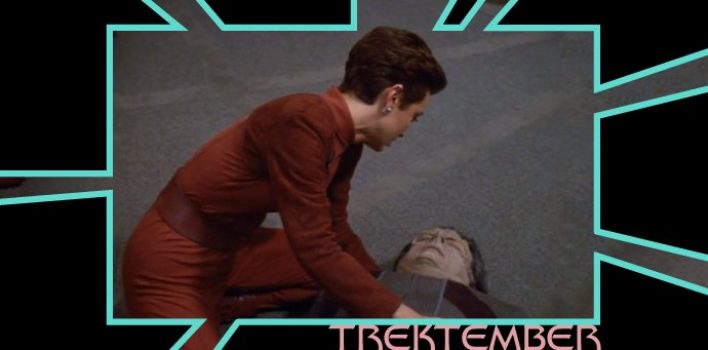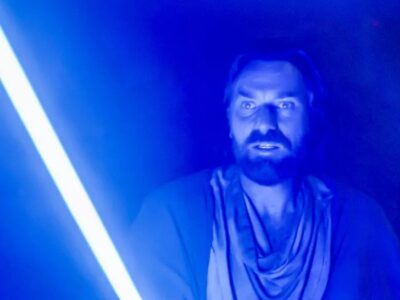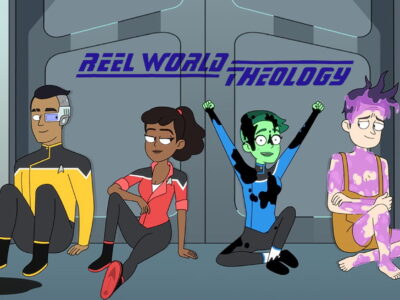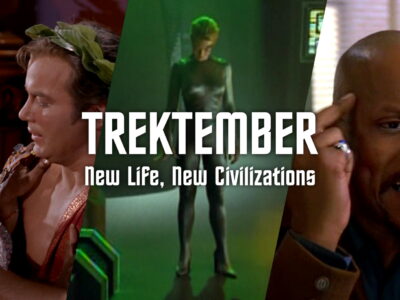Trektember: Duet
“Duet” remains my favorite episode of Deep Space Nine, derivative of Robert Shaw’s The Man in the Glass Booth as it may be. Not just mine; it was featured in The Museum of Television and Radio’s 1994 “Tribute to Excellence;” in evaluating the entire show, the tell-it-like-it-is, sometimes even cranky Cinefantastique magazine ranked this episode as the best of the whole series; and it was also one of the favorites of Executive Producer Ira Steven Behr and frequent episode writer Robert Hewitt Wolfe.
For me, it’s the kind of episode that justifies the existence of an entire series. It’s the “I, Borg” of Deep Space Nine in many ways: precisely written, weighty, hard on its characters and well-acted throughout. I have a friend who frequently says, “All good work is glorifying to God.” I see that here.
The Butcher of Gallitep
Based on nearly-ironclad evidence, Major Kira determines that a Cardassian passing through must be a war criminal, in line with Nazi war criminals who ran death camps, and immediately has him apprehended by security. She pursues an investigation to verify her belief, while the provisional government of her home planet contacts Commander Sisko, assuming the prisoner will be handed over to them for trial.
Some Silence of the Lambs-style interrogations ensue, the Cardassian confident that he is in charge of the conversation with an uneasy, out of her depth Bajoran holding little more than her own convictions. He toys with her. He speaks to her as if he sees through her. Eventually, it comes out that he is not Aamin Marritza, file clerk; he is actually Gul Darhe’el, the leader of a death camp that Kira herself liberated. The newly-unmasked “Butcher of Gallitep” delivers an amazing rant, bold, bare evil, stating itself and its beliefs directly.
Kill me! Torture me! It doesn’t matter! You’ve already lost, Major! You can never undo what I’ve accomplished. The dead will still be dead!
It’s something you rarely get to hear, and the actor pulls it off wonderfully. It’s shocking; shocking to Kira, and shocking to me every time I see it, even knowing where the story is actually going. What a great performance.
But it’s only part of the story.
The Wrong Way
I love a show that wades well into complexity. In a conversation with Dax, Kira is right and wrong in the space of two statements:
Kira: All I want is to see him punished.
Dax: Even if he is just a file Clerk?
Kira: That’s just it, I don’t want him to be just a file clerk, I want him to be…I don’t know, something worse.
Dax: You want him to be guilty.
Kira:As far as I’m concerned, if he was at Gallitep, he is guilty.
Dax: It sounds like you’re trying too hard to believe what you’re saying.
Good people can be wrong, too. If he was there, says Kira, he’s guilty; yet, in saying “I don’t want him to be just a file clerk,” Kira acknowledges that being a file clerk—even in that location, even on the bad guys’ team—isn’t enough for the justice she would like to see. For him to be owed just punishment, his actual hands need to actually be dirty. We often have to wrestle our way to the right thing, and I appreciate this episode showing us Kira in that process. She wants what is good and right; she just doesn’t happen to be there yet.
Do not judge by appearances, but judge with right judgment.
—John 7:24
It’s a requirement that we do our due diligence in pursuing truth, especially ahead of judgment. To validate the destination, we must validate the path; otherwise, we’re just pontificating. If we are Christians who believe that God has everything in hand, and that He is fully just, then we need to be willing to let go of damning and shaming things—even in pursuit of good. We need to let it go, to take vengeance out of our hands (for that is the only thing we grab if we’re holding on to it in the face of actual evidence). It is a high act of faith and trust in His character, knowledge, ability, and truthfulness.
When something looks bad, we aren’t at a stop-and-lob-bombs point. We have to make sure it really is the bad thing we currently think it looks like. To do otherwise only leaves us not reasons, but excuses; and poor, naive, ignorant ones.
And Christans can’t have those.
Lies
The proper and improper pursuits of truth are woven throughout this episode.
When Kira learns that the passenger with Kalla-Nohra Syndrome is Cardassian, rather than Bajoran, she immediately calls security. This is not simply because he is a Cardassian, but because being a Cardassian means that he was not at the concentration camp as a prisoner, but as one who ran it; making him a war criminal.
Her evidence is not merely his race. It’s not the past actions of a like-kind. It’s actual, Sherlockian evidence; conclusive in the very specific context for which she has evidence, experience, and history. By contrast, a Bajoran prisoner, held because of intoxication, asks when the Cardassian will be hanged. He may not know why the Cardassian is there—it’s just a Cardassian, and being Cardassian makes you guilty of…well, something, for sure!
Blessed are they who observe justice, who do righteousness at all times!
—Psalm 106:3
The Commander is right to refuse to turn this man over to the Bajoran government; unjust condemnation is not a right, even of the wronged. Sisko’s response is wise: “We are first going to find out if he actually is a war criminal. If he is, then he is yours!”
An honest witness does not deceive, but a false witness pours out lies.
—Proverbs 14:5
At first, it seems like an open-and-shut case: Darhe’el is a villain, and should be prosecuted for it. Having initially lied, he now attires himself in the truth. But beneath his bluster and posturing, Odo sees a chink in his factual armor; and even with a dear friend grieving the pain this man seems to have caused, Odo has a duty to the truth.
…let us not grow weary of doing good, for in due season we will reap, if we do not give up.
—Galatians 6:9
Kira had been really convinced, and rightly so. The Prisoner was very convincing, so now she needs to be completely convinced to the contrary before she will accept the new information Odo has uncovered. Good for her. And then she is convinced, and she accepts it. Good for her again. The truth comes out.
Marritza is not a war criminal.
Just Another Murder
Actor Harris Yulin’s quality is shown again when Kira gains new evidence, and suspects that this prisoner is lying about who he is. She returns to his cell, and he continues to rant in a pretty similar way as before; but the way the actor plays it, it is no longer credible. He has no tells, no dead giveaways, no cliches actors use to indicate that their characters aren’t telling the truth, but it still falls flat. It’s subtle and quite brilliant.
There is one who pretends to be rich, but has nothing; Another pretends to be poor, but has great wealth.
—Proverbs 13:7
Marritza starts by going on another warmonger’s tirade, trying to keep up the charade; but when he describes the atrocities that happened around him to people he could not help, he breaks into tears that he cannot help. Because he is, at heart, human. I don’t mean that in the sense of Star Trek races, or the franchise’s subtle undercurrent of secularity, but in the small H humanism that even Christians must affirm: one’s kindness and love toward one’s fellow beings. He had adopted Darhe’el’s identity on purpose, to stand in for his race and be punished on their behalf. To be their representative and begin their healing.
Marritza: I covered my ears every night. I couldn’t bear to hear those horrible screams. You have no idea what it’s like to be a coward, to see these horrors and do nothing. Marritza’s dead. He deserves to be dead.
[…]
Kira: You didn’t commit those crimes, and you couldn’t stop them. You were only one man.
Marritza: No, don’t you see? I have to be punished. We all have to be punished. Major, you have to go out and tell them I’m Gul Darhe’el. It’s the only way.
Kira: Why are you doing this?
Marritza: For Cardassia. Cardassia will only survive if it stands in front of Bajor and admits the truth. My trial will force Cardassia to acknowledge its guilt. And we’re guilty, all of us. My death is necessary.
But most of the rotten things done during the Occupation cannot ever be compensated for by people; not by those who did them, and certainly not by innocents. He cannot be their representative, even by his own choice, because in the ways that matter, he is not one of these criminals. If Marritza wants to stand in the place of those criminals he thinks he should represent, and to take punishment for their actions, would that sufficiently absolve the rest of the people who actually did those things?
When Kira learns the real situation, she lowers the force field along with her metaphorical weapons. She returns to him with compassion and wisdom.
Kira: What you’re asking for is another murder. Enough good people have already died. I won’t help kill another.
It’s woven into the fabric of the world that we’re not even good enough to trade our goodness in exchange for our own badness. We can’t even properly pay for our own offenses, so we certainly can’t pay for those of others. Ezekiel chapter 18 is didactic and clear: we are responsible for our own sins.
And even that small burden is something we’re not capable of bearing. This is why Marritza’s gambit is empty. By doing it, he might change perspectives, sway belief systems, or adjust the way two societies are treating each other, but the fact remains he cannot bear the guilt. He’s not capable of it.
In contrast to Marritza, Jesus of Nazareth was capable of bearing the sins of others.
For one thing, He had none of His own to carry. He became one of us so that He could be our representative. Then, hanging on a cross after multiple kangaroo courts, in no way guilty, Jesus “became” sin; and for the first time in eternity, the Father turned His back on Him.
Have you ever had a rift in a friendship? Or thought someone was going to kill themselves? In the end, hopefully the friendship was repaired, or the suicide didn’t happen; but the experience of it remains palpable, because things don’t stop mattering after they’ve passed into the past. That experience of being shunned by the Father, that was an infinite pain; akin to what we feel when someone is ripped from us at death, but stronger, deeper, a much more painful break to Him who is better at feeling stuff than we are.
It was a sufficient payment. It can cover all that Jesus wants it to, and it IS appropriate for him to stand in for us. God accepted His payment.
In some ways, the events of this episode show Gospel truth by contrast, and in some by comparison. Marritza wants to die to save Cardassia: But our blame is rightly applied. We must acknowledge who we are, offenders against a God we hate, whether through anger or dismissal. We, and Cardassia, must repent.
Jesus was not a tribalist. He is the Way, the Truth, and the Life for all of us. We need to accept that His payment was for us, for me, and it was enough. Then, when He calls us “just,” our real debt having been actually paid, it will not be a legal fiction. It will not be as Marritza’s lie. He will call us (and we will be) righteous.









Pingback: Trektember: Season 4 Episode List | Reel World Theology